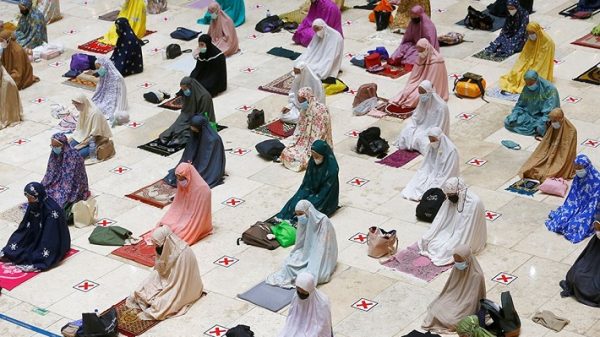What is Ramadan and when is it?

Shawdesh Desk:
Millions of Muslims around the world will be celebrating the start of Ramadan on 13 April.
The festival involves a month of fasting – believers taking part will not eat or drink anything during daylight hours – and prayer.
What is Ramadan?
Ramadan is the Arabic name for the ninth month in the Islamic calendar.
It is considered one of the holiest Islamic months.
It’s also one of the Five Pillars of Islam. These are five principles which Muslims believe are compulsory acts ordered by God.
Muslims believe that some of the first verses of the Islamic holy book, the Qu’ran, were revealed to the Prophet Muhammad during the month of Ramadan. Extra emphasis is placed on reciting the Qu’ran at this time.
Fasting is considered to be an act of worship, which enables Muslims to feel closer to God and strengthen their spiritual health and self-discipline.
How does this work in practice?
Muslims have an early morning meal before dawn, known as suhoor or sehri.
They break their fast after sunset for the evening meal, called iftar or fitoor.
Ramadan is also a time when Muslims are encouraged to give to charity, strengthen their relationship with God, and show kindness and patience.
During this month, believers also head to the mosque for an additional night prayer called Taraweeh. This is only held during Ramadan.
How will Ramadan be different this year?
This is the second Ramadan to fall during the coronavirus pandemic.
For Muslims in the UK, just like fellow believers around the world, this means another year of changes to traditional practices.
The iftar meal is usually shared with family and friends. Because of the lockdown, such meetings will be restricted once more.
However, while mixing between households was banned during Ramadan in 2020, this year the festival coincides with the easing of some lockdown rules in England.
Up to six people or two households can now gather outdoors or in a private garden. Restaurants will also be able to serve meals outdoors.
For those unable to meet, many virtual iftar events and online Islamic lectures are taking place.
What else is changing?
Another change from 2020 is that mosques are once again open throughout the UK, and able to host Taraweeh prayers in the evening.
Mosques in England will ask worshippers to wear a face covering, bring their own prayer mat, and socially distance.
Many mosques are also reducing the length of prayers to minimise the time spent in congregation.
Islamic scholars and NHS leaders are urging Muslims to carry on getting vaccinated against Covid during Ramadan.
Imams say that because the vaccine goes into the muscle, rather than the bloodstream and is not nutritious, it does not amount to breaking the fast.
Muslim mental health organisations are are also encouraging people to look after themselves during these times.
When is Ramadan?
The Islamic calendar follows the lunar calendar of 12 months. Each month begins with the new crescent moon and lasts either 29 or 30 days.
The month of Ramadan begins with the first sighting of the new moon.
In the past, this was done by the naked eye, but in recent years, telescopes and technology have been used.
Muslim countries are spread across a large geographical area, from Indonesia to Morocco, meaning that some Muslims may see the new moon earlier than others.
“Traditionally, Makkah [Mecca in Saudi Arabia] was the centre of sighting the moon,” says Prof Muhammad Abdel Haleem from the Centre of Islamic Studies at London’s SOAS (School of Oriental and African Studies).
“Sometimes even in the Middle East, neighbouring countries will say they’ve seen the moon on different days,” he says.
Saudi Arabia has now said fasting will begin on 13 April, and many Muslim communities around the world are expected to accept this date.
The lunar calendar is about 10 days shorter than the Western calendar. which means that each year Ramadan starts about 10 days earlier.
Who can fast during Ramadan?
Fasting should only be done by people who are in good health.
Some Muslims are exempt:
Those who are sick or ill and whose health will be affected by fasting
Children – although some may begin to practise fasting from a young age
Pregnant and breastfeeding women
Menstruating women
Travellers
What is Eid?
The end of Ramadan is marked with a celebration called Eid al-Fitr.
Many Muslims attend Eid prayers at the mosque and then enjoy a large meal with friends and family. It’s also very common for believers to exchange money and gifts with each other.
Eid falls on 12 May, so celebrations will still be affected by lockdown restrictions.
Although it has become a well-known event in the UK, this is not the only Eid celebration in the Islamic calendar.
Eid al-Adha is celebrated during the month of Dhul-Hijjah. This is the month where Muslims from across the world make the pilgrimage to Makkah known as Hajj.























Leave a Reply